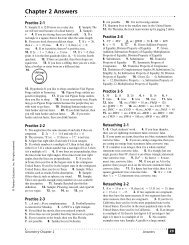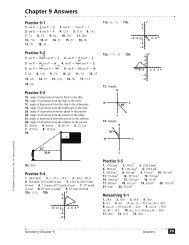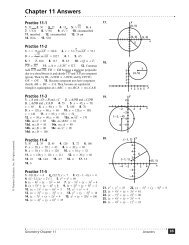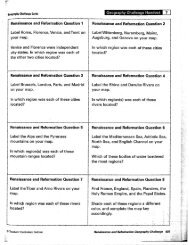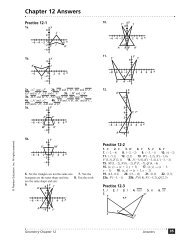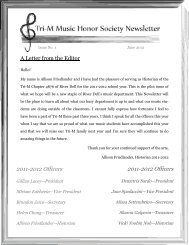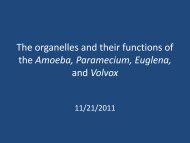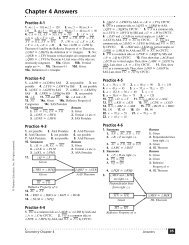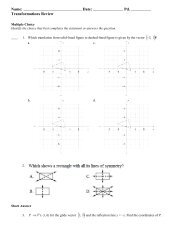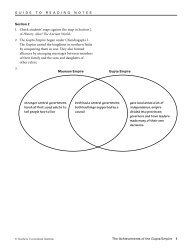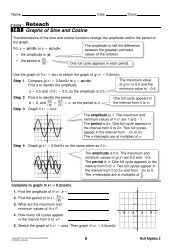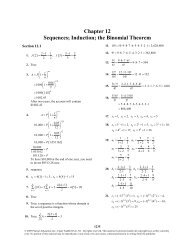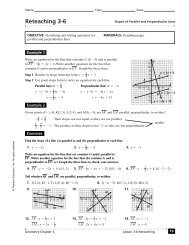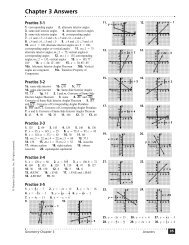High School Handbook - River Dell Regional School District
High School Handbook - River Dell Regional School District
High School Handbook - River Dell Regional School District
Create successful ePaper yourself
Turn your PDF publications into a flip-book with our unique Google optimized e-Paper software.
Research & Documentation<br />
What Is Research?<br />
Research is inquiry in which a student chooses a subject, limits it to something manageable, then investigates the<br />
topic, locating and using appropriate data. Critical analysis is an essential part of any research assignment. The student<br />
must know how to elicit what is relevant and helpful from the sources used, how to draw thoughtful conclusions from what<br />
he has assembled, and how to organize that information to suit his purpose. The library provides a springboard for a<br />
paper, presentation or experimental research.<br />
Good research is meaningful. It takes the opinions and discoveries of others and weaves them into the fabric of<br />
one’s own thought so that the assignment, when finished, is an integration of perception and understanding. Poor research<br />
is plagiarism at worst, mimicry at best: work in which only mechanics are mastered.<br />
The Plagiarism Plague<br />
and How to Avoid It<br />
What is plagiarism? Imagine that it’s a lazy summer afternoon and you are babysitting for your infant brother or<br />
sister. As the baby sleeps peacefully in its stroller in the front yard, you sunbathe close by. After a while, you begin to hear<br />
some unusual noises coming from the backyard. Suspicious, you get up, walk to the back of the house and look around.<br />
Nothing seems amiss. Then suddenly it hits you: the baby! You run back to the front yard and to your utter horror, the<br />
stroller is empty.<br />
The Latin word for “kidnapper” is plagiarius: hence the origin of our word “plagiarism,” which may be defined as the<br />
“unauthorized use or close imitation of the language and thoughts of another author and the representation of them as<br />
one’s own original work” (Random House Unabridged Dictionary, 2nd ed.).<br />
Granted, the nightmarish scenario that opened this chapter is somewhat melodramatic and no one would equate<br />
even the worst act of plagiarism with kidnapping; but there are basic similarities. Both are acts of theft, pure and simple.<br />
Moreover, the theft is particularly heinous because that which is stolen belongs to us in a special way: both the children of<br />
our bodies and the children of our minds are our own flesh and blood, and to take them is to take a part of ourselves.<br />
To realize that the issue of plagiarism is not confined to the narrow halls of the high school, one need only glance<br />
at headlines in The New York Times from the last few years:<br />
“For a Dean at Boston U., a Question of Plagiarism” (7/3/91)<br />
“Plagiarism is Rampant (On College Campuses), Survey Finds” (4/l/90)<br />
“Arsenio Hall Denies Plagiarizing Buchwald Script in Making Film” (7/19/89)<br />
“Court Finds French Author Plagiarized ‘Gone With the Wind’” (12/7/89)<br />
“Eminent Harvard Professor Quits Over Plagiarism, University Says” (11/29/88)<br />
<strong>High</strong>er education, literature, entertainment, and politics – no area of human activity is safe from the plague.<br />
Wherever it strikes, a harsh toll is exacted: degrees denied or revoked, professorships forfeited, thousands of dollars paid<br />
in fines, even presidential aspirations dashed. And like all cheaters, plagiarists ultimately pay with their most valuable<br />
possession: their own good names.<br />
Offering a definition of plagiarism in the abstract is easy, but in the real world the terrain surrounding plagiarism is<br />
marked by many fine lines and gray areas. And since many writers stray into no-man’s-land because they lack familiarity<br />
with its boundaries, we need to map this terrain as clearly as possible.<br />
The examples that appear below are based on the most recent, widely publicized instance of alleged plagiarism in<br />
high places (see the first item on our list, above). In this case, H. Joachim Maitre, Dean of Boston University’s College of<br />
Communication, delivered a commencement address in which he mouthed nearly word-for-word passages that Michael<br />
Medved, a PBS film critic, had written in his article “Popular Culture and the War Against Standards” (Imprimis, February<br />
1991). First, as an example of virtually verbatim plagiarism, we will look at how Maitre handled the passage. (Direct<br />
borrowings of language from the original are indicated by underlining.)<br />
39



